Thank you Evan Oswald: Meet the man who paved the way for Hesston Athletics
By Jasmine Pankratz – Horizon Sports Editor
If you knew me last year, you know I loathed baseball. I sat in the broadcast booth at Oswald Field commentating games, hating the dull sport. I would’ve never guessed that I’d grow to love the beautiful complexity of the game and the magical history that comes with it, all because of this field. No one said it better than James Earl Jones in the film, Field of Dreams: “The one constant throughout all the years has been baseball. Baseball has marked the time. This field, this game: it’s part of our past. It reminds us of all that once was good and that could be again.”
Thanks to C. Evan Oswald, this is true for me. And for Hesston College.
Born in Ohio, Evan Oswald came to Hesston College as a student in 1946 when the school’s opposition to intercollegiate athletics still dominated the campus.
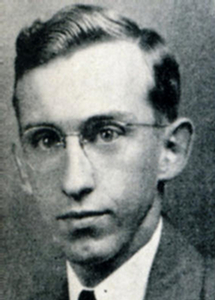
The school’s catalogue made it clear: “HC maintains a policy of strictly intramural athletics. This system best fulfills the purpose of athletics in our educational institution and eliminates some of the attending evils of inter-collegiate athletics.” (Click here for more information on the history of sports at Hesston College.)
But Oswald was determined. He described his persistence in a letter to the 2012 baseball team:
“With Ohio blood in my veins I played so hard in the on campus sports program that President Milo Kauffman called me into his office and asked me if I would consider going to the University of Illinois to get my degree and come back and set up an intercollegiate athletic program,” Oswald wrote.
So Oswald decided to make a career out of his two passions: sports and church.
“Sports for Church Service! That sounded great to me, and that I did for 20 years,” wrote Oswald.
While Oswald was away, the idea of a varsity basketball team was proposed to President Roth. After persuading the administration and sponsors to support the experiment, Hesston played its first college varsity basketball game in 1956. One of Hesston’s supporters, Dr. Fred Brenneman objected to men’s sport shorts, claiming they were indecent. In a letter to Hesston, Brenneman claimed sports would lead to indecent cheerleaders, and hostility between teams:
“Sunday morning weariness after Saturday night games,” followed by “betting, smoking, and theater, and finally [the players would have] no stamina to remain faithful to God’s peacemakers.”
But Oswald returned to Hesston and began a highly organized intercollegiate program. In a phone interview I did with him, I suggested that surely the criticism must’ve been overwhelming at times. Still Oswald was unfazed by the critics.
“I learned to live with opposition,” Oswald told me. “If you felt that what you were doing was right and necessary for the good of the ch
urch and the school, you took the criticism.”
Basketball became the first varsity sport in 1957, followed by baseball in 1958, coached by Oswald. Soccer formed in 1963. Cross country, golf, tennis and track soon followed.
Oswald was the first basketball coach, tennis coach, golf coach, baseball coach and first athletic director, a career that lasted 20 years. The baseball field was built in 1996 and named for “the founding father of athletics” five years later.
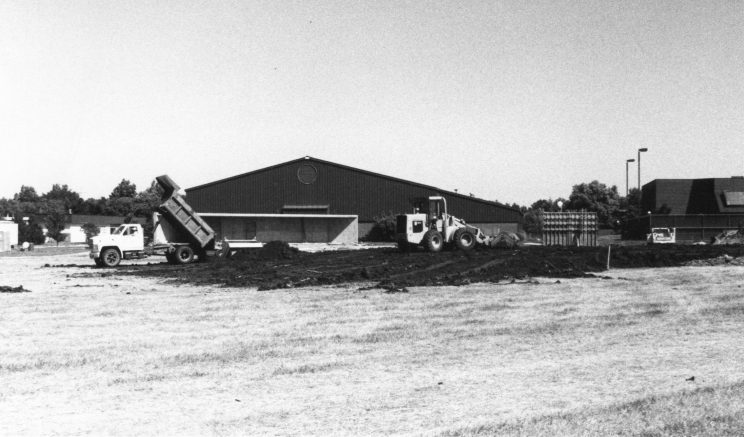
While at Hesston, he coached baseball the longest: 10 years. It’s the sport he’s drawn closest to.
“Hesston College baseball is more than just baseball, it is skill development, recreation, achievement, teamwork,” wrote Oswald. “But it is much more. It is part of the education of the whole person.”
In the early years of Hesston sports, his baseball teams won three league championships. His best season record was 15-3, an 82 percent winning record that still stands. He also coached basketball with his best season record of 16-2, another record remaining today.
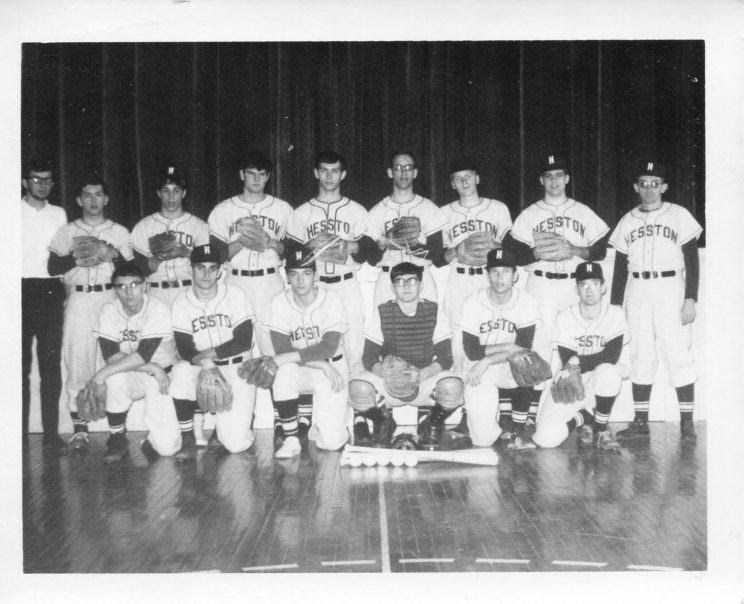
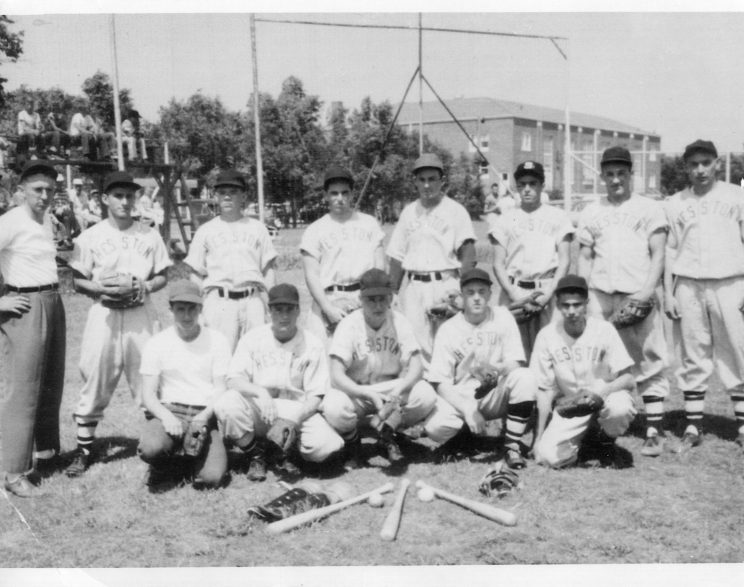
“We did many things that we hadn’t planned on,” Oswald told me. “We built a quality sports program, we were almost always at the top of the league in every sport we had at the time. We got things going pretty good.”
But that was only the beginning of success for Oswald.
After 20 years at Hesston College, Oswald and his late wife, Martha, unintentionally ended up at Navajo Community College (now Dene College) in Arizona. The plan changed from a one-year sabbatical away from Hesston to a 14-year career helping build an athletic program.
He developed a strong varsity archery program that continues today. He recruited by asking one simple question:
“Do you want to be a winner?”
And win they did. In 10 years, his archery program won five state championships and competed in six U.S. collegiate archery championships, winning second among U.S. community colleges at the Olympic Village in 1981.
Oswald also helped officiate the archery championships at the 1984 Olympic Games in Los Angeles, CA. But he wasn’t ready to sit in the rocking chair just yet.
He spent 10 years as the director of activities at the Glencroft Retirement Community. He’s also played in the Phoenix Table Tennis Club for over 28 years.
“I’m 93, I have neuropathy and vertigo, but still play in the Table Tennis Club,” Oswald wrote.“That’s TABLE TENNIS, NOT PING PONG.”
He’s competed in four National U.S. Senior Olympics and managed to match the sound of success that has echoed throughout his life.
“In the qualifying Arizona State Senior Olympics, I didn’t have any competition in the 90-94 age group so I had to play down in the 80-89 age group and I beat their gold medalist in that age group,” he wrote in a letter to family and friends.
And even at 93-years-old, he’s still coaching.
“I’m still a sports nut,” Oswald told me. “I’ll sit and watch the Diamondbacks, turn off the sound and I’ll coach the pitchers to tell them what to pitch. Three out of four times I’m right.”
But even after the full life he has lived, Hesston will always hold a place in his heart.
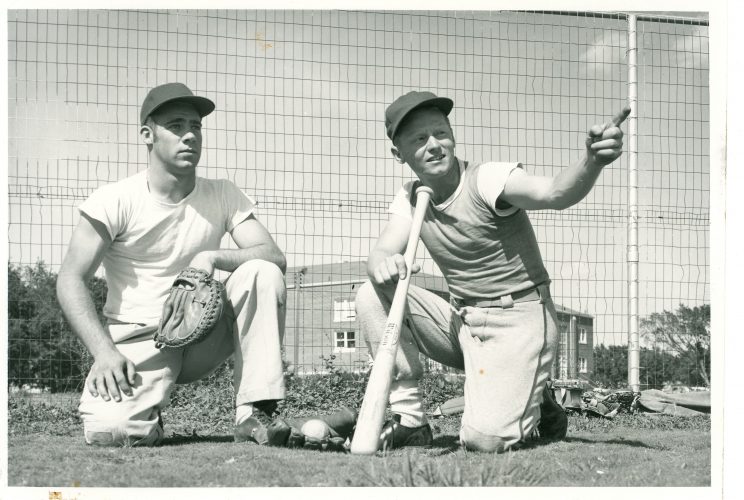
“I left HC but it still remains my second home in my priority of thinking,” he wrote. “None of the other schools compared to the influence that HC had on my life, though I value them all. I’ll be back next September for my 70-year reunion, even if I have to crawl back.”
For Oswald, Hesston College, much like sports, is something he believes in.
“You might never guess what your HC experience will mean to you down the road,” he wrote. “I played so hard at HC as a student and took the opportunity to be in many other activities that it changed my world.”
So if you see Oswald on campus next fall, take a minute to stop and thank him. Thank him for bringing the magic of sports to Hesston College.
Historical quotations compiled from John Sharp’s “A School on the Prairie,”


